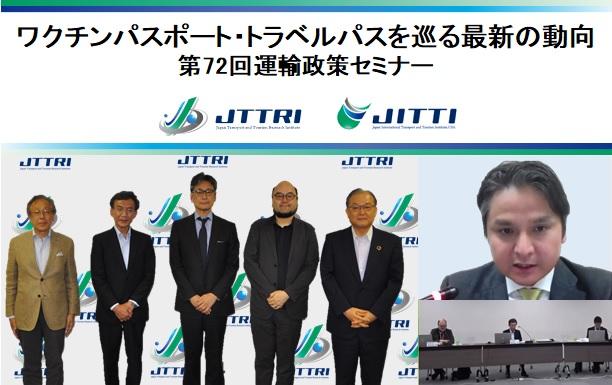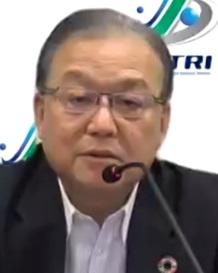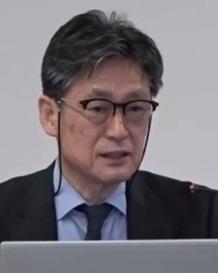The Latest Trends in Vaccine Passports and Travel Passes
- Seminar
The 72nd Transport Policy Seminar (Online)


| Date / Time | Fri, Jun 25,2021 10:30am - 12:30pm |
|---|---|
| Event Number | The 72nd |
| Theme | The Latest Trends in Vaccine Passports and Travel Passes |
| Lecturer | ①Special Report: Current Status of COVID-19 in the United States Reporter: Tetsuhiro NAKAGAWA Senior Representative, Japan International Transport and Tourism Institute, USA (JITTI-USA) ②Lecture Theme (1) The Possible Solution for the Safe International Travel During the Pandemic Lecturer: Hirofumi OKOSHI Director, Japanese Society of Travel and Health (JSTH) Theme (2) Current Status of Digital Health Certificates; CommonPass, etc. Lecturer: Takanori FUJITA Project Lead, World Economic Forum Centre for the Fourth Industrial Revolution Japan Project Associate Professor, Keio University School of Medicine Theme (3) Digital Health Certificates and Integral Solutions for the Airline Industry Lecturer: Shuichi FUJIMURA Visiting Research Fellow, Japan Transport and Tourism Research Institute (JTTRI) Full-time Advisor, All Nippon Airways Co. ③Panel discussion and Q&A session Coordinator: Hirotaka YAMAUCHI, President for Research, JTTRI Panelists: Reporter and Lecturers |
Event Summary
“Vaccine Passports," which certify vaccination against new COVID-19 infections, and "Travel Passes," which certify negative results of such tests as PCR, are being implemented in Europe and the U.S., such as the EU's July 1 systemization, for they contribute greatly to facilitating travel procedures, especially international ones. In Japan as well, the government has been considering the utilization of vaccine passports, and travel passes demonstration experiment has been underway with the participation of major airlines. However, there are still concerns that the use of such systems in Japan may lead to discrimination against the unvaccinated, and issues such as ensuring the accuracy and compatibility of the systems remain both at home and abroad. In particular, in Japan, where vaccination and inexpensive/easy testing are still in the process of widespread use, it cannot be said that there has been sufficient information-sharing, open discussion and debate throughout our society. In this seminar, we will receive a report on the latest situation in the U.S. from Mr. Nakagawa, a lecture on the current status of vaccine and PCR testing in case of international movement from Dr. Okoshi, a lecture on the latest status of “digital health certificates" using ICT from Dr. Fujita, and a lecture on the latest responses and views in terms of the airline industry from Mr. Fujimura Based on these presentations, we discussed the expected movements and the ideal form of the future.The seminar was a great success with 828 participants from universities and other research institutes, the Ministry of Land, Infrastructure, Transport and Tourism, transportation companies, and consultants.
Program of the seminar is as the following
| Opening Remarks |

SHUKURI Masafumi |
|---|---|
| Special Report |

NAKAGAWA Tetsuhiro |
| Lecture: Theme1 |

Hirofumi OKOSHI |
| Lecture: Theme2 |

Takanori FUJITA |
| Lecture: Theme3 |

Shuichi FUJIMURA |
| Panel discussion and Q&A session |
Coordinator: Hirotaka YAMAUCHI, President for Research, JTTRI |
Outline of the seminar
The outline of the lecture and panel discussion is as follows.
1. Special Report: Tetsuhiro Nakagawa, Senior Representative, JITTI USA
‣After the rapid spread of the disease in winter (November-January), the number of new infections and deaths decreased significantly due to the acquisition of natural immunity and the spread of vaccines, and this trend has continued to the present.
‣As a result, economic restrictions have been lifted in the U.S. states since May, and the movement of people has become more active (roughly recovered to 70-80% of its pre-Corona level).
‣The vaccine shot has spread at a rapid pace due in part to the government's efforts, but it has reached a ceiling, especially among young people (at the level of 70% of adults).
‣Vaccine recipients receive record cards, but rarely have the opportunity to show them (i.e.no occasions when they are distinguished by whether they are vaccinated). However, there is a movement to make it a condition for employment and school attendance, which may be controversial in the future.
‣However, the number of cases has been declining as additional infections have been reduced and vaccines have become more widely available. “Negative certification" may be the requirement for certain travel and activities, such as travel outside the country or state, and medical visits.
2. Lecture (1) Hirofumi Okoshi: Director, Japan Society of Travel and Health
‣COVID-19 has rapidly spread throughout the world. One of the reasons for this is the remarkable increase of people traveling abroad compared to those at the time of outbreaks of SARS 18 years ago and those at the time of the novel influenza 12 years ago. Therefore, the concern is infection during travel, but the rate of secondary infection in public transportation is extremely low. This is probably due to the effects of ventilation in the cabin and car, securing seat space, and the wearing of masks by passengers.
‣When an epidemic spreads, we usually take countermeasures such as what we call “measures to avoid the 3 Cs (closed spaces, crowded, places, close-contact settings)”, self-restraint, and lockdown, but if these measures are taken for a long time, it will place a heavy burden on the economy and social life. In addition, negative effects on health such as lifestyle-related diseases and mental illnesses will also occur.
‣This is where vaccines come into play. Vaccination is effective in preventing serious illness, onset of disease, and infection. As the vaccination rate and the number of immunized people increase, herd immunity or cocooning (a situation in which immunized people protect non-immunized people like a cocoon) occurs, and the infection is contained. Theoretically, in the case of COVID-19, it is thought that herd immunity can be achieved when about 70% of the population is vaccinated. However, for mutant strains, a higher vaccination rate may be required.
‣In Europe where relatively more people have been already vaccinated, they will introduce Digital Vaccination Certificates from July, while in the U.S., they have already implemented preferential policies such as exemption from pre-departure inspections and voluntary quarantine for those who have been vaccinated. The Japanese government also hopes to begin with the issuance of written certificates by the end of July.
‣Future issues include increasing the vaccination rate (including expanding the target age range), digitizing vaccination certificates, and easing restrictions on vaccinated persons. In particular, digital certification is expected to prevent loss, non-carrying and forgery, to improve the efficiency of procedures, and to be utilized for vaccination records and various documents.
3. Lecture (2) Takanori Fujita: Project Lead, World Economic Forum Centre for the Fourth Industrial Revolution Japan / Project Associate Professor, Keio University School of Medicine
‣The Commons Project (TCP), based in Switzerland, has been developing Common Health, a health management application, and CommonPass, a digital certificate application based on Common Health. A system has been developed to check the contents of digital health certificates of travelers, such as their PCR test results and vaccination records, against the entry and exit requirements of the destination country, determine whether they can enter the country, and enable them to enter and exit the country using the QR code displayed.
‣In addition, TCP and the World Economic Forum have been promoting a framework called the Common Trust Network, in which 32 countries currently participate to establish common rules for facilitating the entry and exit of travelers with infection control measures through the use of applications such as the CommonPass. The CommonPass was tested as the EAC Pass in the East African Community last year, and from March 2021, a demonstration experiment will be conducted for flights from Japan to the U.S. and Singapore with the cooperation of JAL and ANA. In the experiment the QR code displayed on the CommonPass would be utilized for the immigration procedures.
‣On the other hand, as for the status of digital health certificates in other countries, the use of the Digital Green Pass (EU Digital COVID Certificate) in the EU and the NHS app in the UK have been progressing, while in Israel, the vaccine passport was introduced and then discontinued once the number of infected people was under control, and in the U.S., the status of efforts differs from state to state.
‣Future issues include reflecting the latest entry/exit conditions of each country, connecting with airline ticketing data, dealing with nationals from Japan and other countries that issue paper negative certificates, and consideration to non-digital device holders. Furthermore, since these efforts are based on bilateral agreements, standardization by international organizations is necessary to expand the efforts worldwide.
4. Lecture (3) Shuichi Fujimura: Visiting Research Fellow, Japan Transport and Tourism Research Institute (JTTRI) / Full-time Advisor, All Nippon Airways Co.
‣The impact of the new coronavirus infection on the airline industry is enormous, and some predicts that it will take 4 to 5 years for airline demand to recover to pre-coronavirus levels. On the other hand, the other estimates that the time required for various procedures at international departure and arrival airports will increase significantly from 1.5 hours (before the COVID-19 outbreak) to 8 hours, assuming that paper certificates are still used for screening, due to the increased need to confirm vaccination certificates and negative test results, which would make those airports dysfunctional. Therefore, we can say the digitalizing certification documents is an urgent issue.
‣The following issues have also become apparent in the digitization of certified documents.① The proliferation of digital health platforms and their lack of interoperability.② No preferential entry/exit restrictions or quarantine measures have been established for those who have been vaccinated.③ Lack of international uniformity in test specimen sampling methods.④ Lack of established methods to protect personal information such as proof of vaccination.⑤ No method has been established to digitize the process of verifying credentials at the time of immigration.It is now required to solve these problems and provide "safe, easy, and convenient" air travel even in the era of “With Corona”.
5. Panel discussion and Q&A session
With Dr. Yamauchi President for Research, Japan Transport and Tourism Research Institute (JTTRI) as the coordinator, the discussion focused on the five issues raised by Visiting Researcher Fujimura. The main exchanges are as follows.
<Regarding the fact that no preferential entry/exit restrictions or quarantine measures have been established for those who have been vaccinated.>
‣In the U.S. and Israel, the easing of restrictions was envisioned from the beginning of vaccination, and this easing was promoted through the use of various data; on the other hand, unfortunately Japan is lagging behind. In Japan, the situation is quite severe because of conducting the Olympic and Paralympic Games, but I think it will become easier to discuss once those games are over.
<Regarding the lack of international standardization of test specimen collection methods.>
‣In Japan, the main focus is to diagnose the disease, so test methods that give false negative results when the viral load is low are excluded. In the future, testing methods should be considered from the perspective of whether an infected person is at risk of transmitting the disease to others.
<Regarding the lack of established methods to protect personal information such as vaccination certificates.>
‣In order to comply with the GDPR and other regulations, it should be standard practice to permit users only to have data that they have authorized on their smartphones.
<Regarding the proliferation of digital health platforms and their lack of interoperability.>
‣For the convenience of users and airlines, mutual cooperation is essential, but there are many issues to be addressed.
‣It is difficult to completely unify those platforms, but it would be good if they could be consolidated into two or so. There is also a movement toward standardization by public international organizations (de jure standard), and we would like to work together with them.
‣It is desirable for airline alliances to cooperate among them rather than to compete with each other. As a process for verifying certificates at the immigration checkpoint, it would be desirable for the system at the immigration side to support Multi Wallet and be able to read various QR codes, as in Singapore.
Next, we discussed questions from the audience. The main exchanges are as follows.
Q: In the EU, there are three types of certificates: negative certificates, vaccination certificates, and infection history certificates, but I heard some people say that these should not be treated equally. What is the difference? How do they differ?
A: A negative certificate by PCR test is only valid at the time of the test and will expire after the flight. Vaccination, on the other hand, generally has a preventive effect of 90% or more, so a certificate of vaccination is considered to be valid for about six months. As for the certificate of infection history, in the U.S., it is assumed that the test taken within the past three months has been positive. The WHO is considering guidelines for the handling of the three types of certificates and will decide on them in the future.
Q: I think it is necessary for governments to recognize a vaccine passport issued in one country as acceptable in another. Are there any moves to promote common certification worldwide?
A: This matter should be decided through bilateral negotiations, but WHO has been also trying to come up with a unified international guideline, though having with great difficulty. For this reason, we believe that it is necessary to coordinate with the World Economic Forum, as well as with multiple meetings at the level of heads of governments, and between national authorities.
Q: Do you have any thoughts on how to restore the social fabric, not just of aviation, to its pre-pandemic level?
A: The first thing to be done is to improve the tightness of medical care and to acquire herd immunity among the elderly. I also think that the operation of vaccine passports during visits should be promoted. In this regard, it is important to discuss opinions from various angles, including not only the business world but also the medical world. In addition, it would be good if the Japanese government could also take action, not only from the bottom up, but also from the top down, by sharing information on overseas situations and making international comparisons.
6. General Comment
Hirotaka Yamauchi, President for ResearchWe believe that we provided a wide and deep range of information today.The current situation of the world, both economic and social, is not only a problem for airlines, so it is important to find a way to end this kind of abnormal situation as soon as possible. Under this unprecedented situation, the restriction of movement poses the biggest problem of all. The question is how to restore the freedom of movement and freedom of action.Today's discussion made me keenly aware of the fact that there are still many issues to be addressed, that nevertheless we must move forward with a sense of speed, and that the question is what we can do and what we can ask of politics to achieve this.
This report has been compiled under the responsibility of the organizers.


